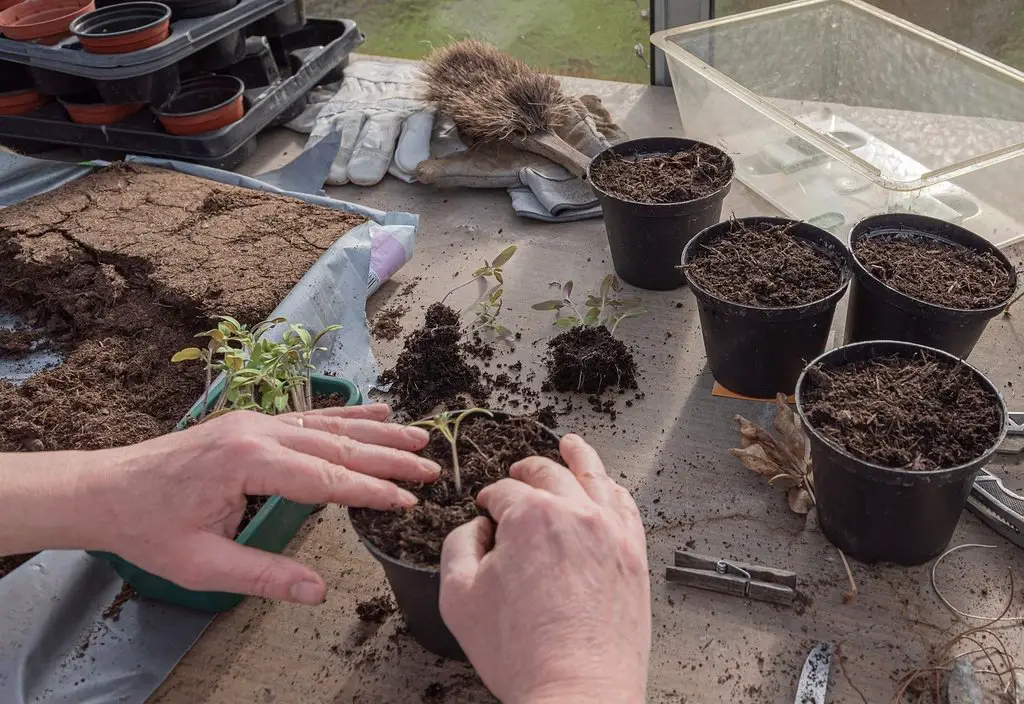Best Soil for Herb Growing

A question asked by many gardeners today is what soil is best for growing herbs. I don’t know about you, but I prefer to grow my herbs in loose soil that holds moisture and doesn’t need much fertilizer and water. I use this Professional Grower Mix with nothing but exceptional results every time. Get today’s price on Amazon.
So what kind of soil should I be using? Well, it all depends on what you want to plant. If you are starting a herb garden for personal use, or simply want to add a little taste to your cooking, then you may want to stick with soil made of compost. It’s not very expensive, has minimal maintenance, and can be easily mixed with your regular potting soil.
There are four basic soil types for growing herb plants in your garden: rock, sandy, loamy, and clay. Each type has its own unique properties which make it perfect for certain types of plants and may not be ideal for other plants.
Table of Contents
Soil Types
Clay
Clay is suitable for the beginning gardener, but not so much for those looking for something more dense and substantial. It does, however, offer excellent drainage for plants that need more moisture.
Clay tends to retain moisture well and will provide a rich supply of nutrients to all plants. Clay is also known as “organic soil” in some circles, and is an excellent choice for using around mulch layers to provide extra nutrition for plant roots and soil.
Clay is the hardest and most durable soil to grow plants in. It can withstand the weight of heavy, compacted soil or plants and survive being watered. It also has the most natural protection from pests and disease but cannot be planted near trees, shrubs, hedges, or grassy areas.
Clay soil, below 0.002 mm, generally has an acidity level which prevents it from holding moisture well. But its natural resistance to pests and disease makes it great for herb gardeners who need a thick layer of plant nutrients and minerals.
Clay has many other qualities as well, including resistance to heat, disease, and weeds. It also holds air well, protecting plants from cold weather, and is perfect for areas where temperatures can fluctuate.
It also does not require much maintenance, with only a little mixing required. The only drawback to clay is that it tends to absorb plant nutrients quickly. This can cause a deficiency in some plants if they are not providing enough for themselves.
Rock
Rock is an excellent choice for any gardener. It does not have the same characteristics as clay but instead has a higher alkalinity level. This means more potassium and magnesium. If you don’t like the idea of a thick layer of soil, you can opt for a loamy soil mix instead.
Loam tends to be less absorbent and is usually made up of finely ground coarse sand, clay, and compost. The compost added is rich in nitrogen, a valuable plant nutrient that keeps plants growing strong and healthy.
Loamy Soil
Loamy soil mixes are ideal for gardeners who want an even mixture of nutrients. They are ideal for plants such as basil, mint, and dill. This is because they hold the moisture well but are not too thick to discourage the growth of weeds.
Loam is also great if you’re looking for a good organic soil to start a garden from scratch and doesn’t require too much effort to maintain. Since it is made up of finely ground finely crushed and finely powdered plants, you can use it in a variety of ways, such as topsoil. To fill in bare spots in flower gardens, or fine gravel to provide extra drainage.
Sand
Sand can be used in a variety of different ways when creating the various types of soils for growing herbs. Sand is great for plants which don’t need as much moisture.
It’s also perfect for growing plants for indoor gardening. Sand is ideal for covering over the surface of containers to prevent the roots from drying out or growing to the point of collapse.
Choosing the right type of Soil
It is important to choose the best soil for herb growing. While some people prefer to grow herbs in a container, it is not always the most conducive growing environment. The soil you choose must be rich in nutrients but must also retain moisture for long periods of time. It is the moisture retention that is important for a variety of reasons.
A well-drained soil has very few nutrients in it but also has little or no moisture. This type of soil is usually sandy or loose with a light soil content. This type of soil is typically found in dry, desert areas.
When you choose your soil, keep in mind that there are many types to choose from. Soil types may include clay, sand, and compost. Some of the most popular types of soil to grow herbs on include clay, limestone, and decomposed garden waste.
Clay can be used to build strong soil, and is the type that many gardeners prefer. Limestone and decomposed garden waste are good choices as well and have a high water retention rate.
Soil types will be different depending on what types of plants you are growing. For example, if you are growing culinary herbs, you will need a more moist, but nutrient-rich soil.
If you are growing herbs for your garden, you can use either type of soil, but be sure to choose the right one for your herb plant. Here are some general guidelines.
Choosing the right type of soil can be tricky. There are some general rules to follow when making your choice. The first is to make sure the soil is rich in nutrients and retains moisture.
Next you need to make sure the soil drains well and does not get compacted quickly. It is also important to know which types of soil will work best for what type of herb you are growing.
Some herbs will require more moisture while others are more delicate. When considering soil types, keep in mind that they should also retain the proper amount of sunlight so that the plant can absorb nutrients.
If you are new to growing herbs, you may want to start with a coarse type of soil, such as peat moss, rock silt, or sand. This can help you decide on a good combination of soil for your plant.
Most types of peat moss contain calcium, phosphorus, iron, sodium, potassium, and magnesium that will provide proper nutrients for your plant. Other types may contain copper, manganese, zinc, sulfur, and boron. You may also want to consider adding compost to your soil to enhance its nutrients.
Improving your Soil Quality
In order to improve the quality of your soil, you can also add compost, mulch, sand, or peat moss into your soil. These can be added with a spade.
These materials will add extra nutrients to the soil. Mulching will also help to maintain the moisture level in the soil by providing nutrients to the roots of the plants.
Mixing Soil Types
When choosing your planting bed, it is important to make a good mixture of soil types. Too much clay or too much woody material can cause your plants to experience root rot. Make sure there are some rocks in your planting area for drainage and to improve air circulation.
If you have a slope, you should still be careful to keep a good mixture. To prevent root rot, you can use a bonsai soil, which consists of several types of organic matter mixed together.
Conclusion
Choosing the best soil for herb growing also depends on the climate of the area where the plants will be located. If your garden will be in a dry environment, you’ll want to make sure that you choose a soil that drains quickly.
If you live in a hot area, you’ll want to choose a cool and moist soil. Depending on the weather, you’ll need to consider some factors to help determine what type of soil will work for your plantings.
Watering the plants will also affect the soil. If you plan on watering frequently, you’ll need to choose a soil that drains well. This can be a challenge, though, so look for options such as mulches that act like water, and prevent excess evaporation.
You should also make sure that the soil that you choose for your plantings is compatible with the type of plants you plan on growing. Certain types of crops require more nutrients than others, so it’s important that your soil for herb growing is rich in nutrients and minerals.








